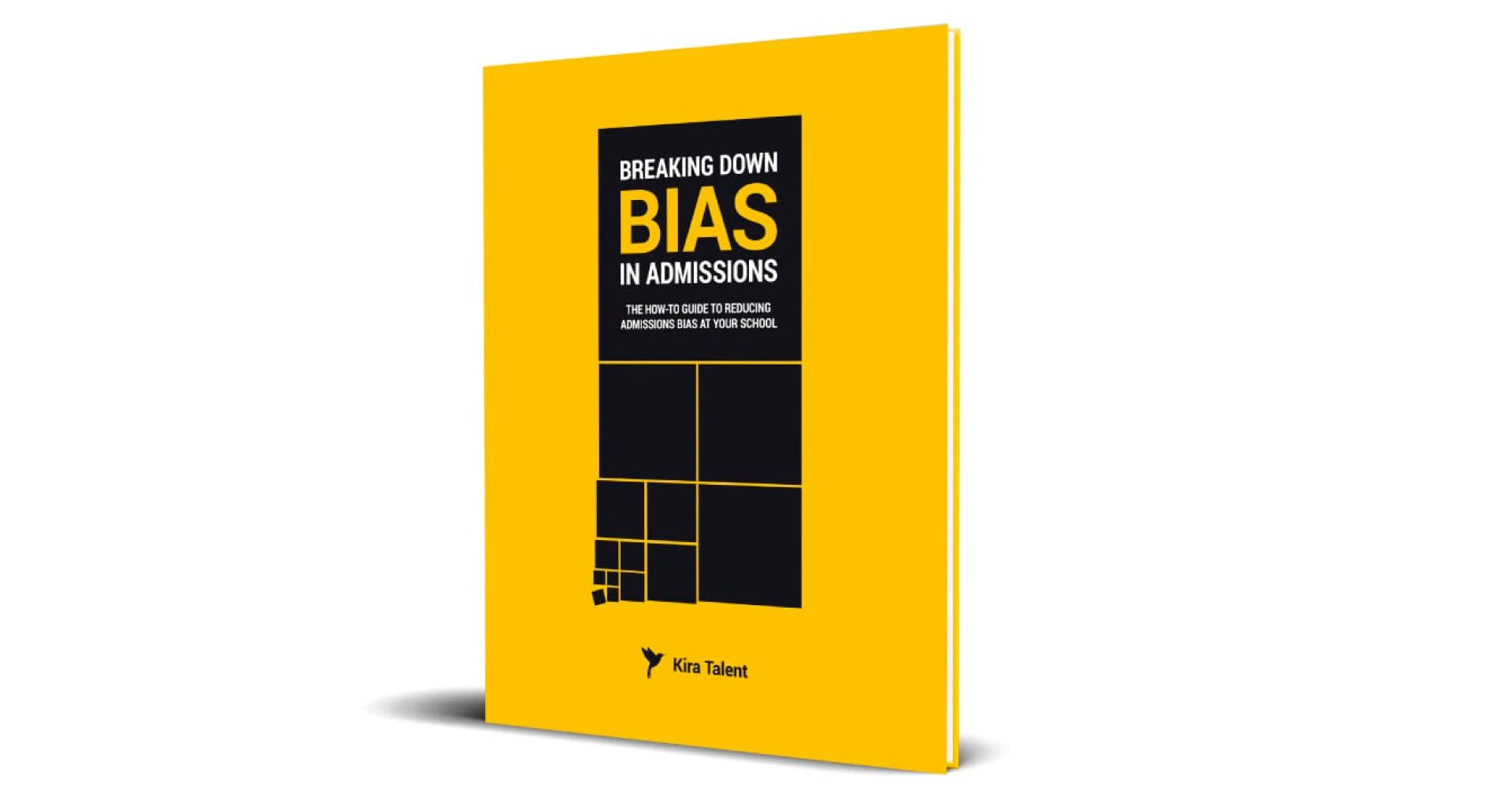At the University of Connecticut School of Law, students get the best of both worlds. A big school name with a small school feel, UConn Law boasts a six-to-one student-to-faculty ratio even as they count alumni in 50 US states and more than 50 countries around the world.
“Oftentimes the drawback of going to a school with a big name and a big reputation is that you're on a big campus where it's easier to fall through the cracks and harder to make personal connections,” explained Lauren Terbush, the Director of JD Admissions at UConn School of Law. “But that is not the case here. You'd be hard-pressed to find an employer who hasn’t heard of the University of Connecticut, but the law school itself is fairly small so you get that intimate classroom setting.”
Receiving an average of 1,500 applications per year, UConn Law knows that this on-campus environment is a significant draw for prospective applicants — many of whom want the opportunity to demonstrate why they would be successful in such a collaborative environment.
“In my 10 years of working in law school admissions I've frequently been asked by applicants if we have an interview opportunity,” Terbush explained. “While we’ve always wanted to include an interview in the admissions process, we wanted to ensure that we were doing so equitably, which for us means offering an interview to every candidate.”
“When we discovered Kira Talent, we realized we could finally add that long-sought-after component to our application,” Terbush shared.
A future-proofed process to identify applicant fit
“Any seasoned admission professional knows that a written application can’t capture an applicant's whole story,” Terbush explained. “The question is: what other aspects should we be giving deference to?”
“Law school admissions have long held a serious reliance on traditional, quantitative indicators of academic success such as standardized tests and undergraduate GPAs,” she shared. “However, the shift towards test-optional policies in the undergraduate admissions space raises the possibility that law schools may one day adopt the same strategy. With that in mind, we want to start building and refining a holistic admissions process now so that we’re prepared for the future.”
“Employability has also become a much larger focus in recent years,” Terbush continued. “Prospective students want to go to schools that have the best employment rates, so admissions teams are looking to evaluate employability in the admissions process. What better way to evaluate employability than with an interview?”
“The interview component allows us to get a better sense of who a candidate is, giving us a more holistic view of our applicants’ capabilities and overall program fit.”
A structured and quantifiable way to measure qualitative skills
“Asynchronous interviews aren't necessarily new in law school admissions,” shared Terbush. “Every year I'm hearing from colleagues across the country who have added an interview component to their admissions process. When we decided to bring an interview into our process I spoke to those colleagues and got their advice on several different platforms. When we compared our options, Kira stood out from the rest.”
One group that Terbush spoke to was her colleagues at the University of Connecticut School of Business’s MBA program who had already been using Kira for 8 years.
“For their admissions team, the quantitative element of scoring in Kira made all the difference, allowing them to use the assessments to make scholarship determinations,” Terbush explained.
“With Kira, you get a quantitative measure of qualitative skills.”
Kira’s structured evaluation and custom rubrics allow UConn’s reviewers to assess all applicants with the same competency-based criteria that is unique to the process at UConn, producing an overall score.
Learn more about scoring and analytics in Kira’s Asynchronous Assessment
“Quantitative factors are highly valued in law school admissions, and there is a rationale to that,” Terbush continued. “Where quantitative factors are easy to assess, rank, and organize, it can be very difficult to compare two qualitative reviews. With Kira, we get a qualitatively informed quantitative factor.”
Making a new process painless with a user-friendly product and exceptional client support
“When we spoke to other Kira clients to learn more about their experience, the one thing that always came up was the fantastic customer service,” Terbush shared. “That proved to be true throughout our onboarding and launch.”
“It certainly helps that the platform is very user-friendly,” she continued. “Some of my colleagues are somewhat wary of technological advancements, and even they were pleasantly surprised at how easy the Kira platform is to access and navigate. But no matter how simple a platform may be, it’s a significant undertaking to create and launch an entirely new element in your admissions process.”
“The Client Success Team at Kira made it not only possible but painless,” shared Terbush. “We made the decision to launch Kira only six weeks before the start of the admissions cycle.”
“It was an impossibly quick turnaround and while I would recommend to others to give themselves more time, Kira simply told us not to worry, they would get it done.”
“Kira sectioned the onboarding process into digestible chunks so that it never felt overwhelming for us,” she explained. “Meetings were scheduled periodically, each with a clear focus on what we were going to learn that day and the key takeaways from each session. The whole support team was very organized and even-keeled, taking us step-by-step all the way to the launch.”
Maintaining the integrity of the admissions interview with plagiarism detection
“Creating the assessment was similarly a structured and collaborative process,” shared Terbush. “We already knew what competencies we wanted to assess, so Kira helped us determine what style of question – behavioural versus open-ended – and response – written versus verbal – would elicit the most effective data points about our applicants by really hitting on the competencies that we were looking to assess.”
“Behind the scenes, Kira’s integrity metrics and security features also help us ensure that we’re assessing what we want to be.”
“Kira tracks applicants’ typing speeds for their written responses, browser refreshes, and flags suspicious behaviours so that our team can investigate further,” Terbush added. “With the rise of generative AI, we know how that can impact the integrity of written applications, which is why we love having this added layer of security. After all, writing is one of the most essential skill sets that a lawyer needs to have.”
Finding the diamonds in the rough
“As our first cycle of applicants complete their Kira assessment, I’m loving how we’re able to get to know our candidates better,” Terbush shared. “We’ve already seen cases where applicants who may not have stood out on paper shine in their interview.”
“We can see that they’re going to be a great fit for our institution and that they have that employability factor,” she added.
“It feels like we’ve got an assessment that’s helping us evaluate exactly what we should be evaluating for, and that’s really crucial and very exciting.”
For students looking to complete an undergraduate degree in business, the University of Toronto’s four-year Commerce degree at Rotman College likely ranks high on their list. Housed on the beautiful St. George campus in downtown Toronto, Rotman School of Management is ranked as the top business school in Canada and among the top 20 business schools in the world. This sterling reputation is part of the reason why the commerce program draws more than 8,000 applications per year, creating a challenge for their admissions team.
“Thousands of high-achieving students with perfect grades apply to the commerce program each year,” shared Miriam Irvine, a Recruitment and Admissions Officer at Rotman Commerce. “In order to distinguish between them we needed to take a more holistic approach.”
“Adding a Kira assessment to our admissions process has allowed us to do just that,” she added, “giving us deeper insights into applicant potential while increasing the efficiency and integrity of the process.”
Designing a holistic review fit for a world-class program
“Holistic review has been top of mind for our admissions team for several years now,” Irvine shared. “We always want to remain at the forefront of admissions best practices, and for us that means listening to all the research that has been done into the importance of non-cognitive skills, such as grit and resilience, and the role that those skills play in determining student success in the program and beyond.”
“Beyond grades, we want to see what else a student can bring to our program and what support we can offer that will help them succeed.”
“Equally important to us was that this supplemental application was structured in such a way as to allow us to mitigate instances of bias and ensure the authenticity of the submissions, even as we scaled the process across thousands of applicants and dozens of reviewers,” shared Irvine.
“The supplemental application is there to give us a deeper understanding of our applicants,” she explained. “In order for that to be successful, we need to ensure that applicants are being assessed on their own work and that merit is assigned uninfluenced by bias.”
“The final consideration was volume,” she continued. “During peak times, the system needed to be able to handle the activity without any technical issues. At the other end of the process, our reviewers needed to be able to efficiently assess applications at a high volume as well.”
Identifying the best applicants for the program faster
“The Asynchronous Assessment in Kira Talent met all of these requirements and more,” Irvine shared. “Since 2015, we’ve had every applicant to Rotman Commerce complete an on-demand timed video and timed written assessment with Kira.”
Working with the team of experts at Kira, Rotman Commerce identified a set of core competencies and created a bank of questions that allow reviewers to assess applicants for these all-important soft skills.
“Once an applicant completes their assessment, it’s assigned to a team of reviewers who score the applicant using a clearly structured and defined rubric,” Irvine explained. “Our reviewers go through extensive training by our Center of Professional Skills to ensure accurate and consistent scoring across candidates.”
“The on-demand nature of the assessment lets us have multiple reviewers simultaneously reviewing the same application completely independently,” she added. “This keeps the process moving efficiently and helps us mitigate admissions bias.”
Utilizing tech to identify instances of plagiarism and generative AI in admissions
“The integrity of the admissions process is very important to our senior management team, our faculty, and our recruitment admissions team,” Irvine shared.
“We want to ensure that deserving students are receiving offers of admission.”
“That’s where having an industry-leading tech partner like Kira makes all the difference,” shared Irvine. “We use Kira to automatically flag potential instances of plagiarism or inauthentic submissions across all 8,000 applicants.”
Powered by Turnitin, SimCheck is Kira’s fully integrated plagiarism and generative AI detection software that automatically crosschecks all written materials submitted via the Kira platform with other submissions, as well as Turnitin’s database of over 91 billion webpages and sources.
Learn how Imperial College Business School is using SimCheck across 15+ programs
“SimCheck allows us to see when an applicant has taken content from another source, whether that’s an online source or another candidate’s own submission,” explained Irvine. “The tool helps us ensure that we’re giving offers of admissions to applicants who have worked hard on their supplemental application and have submitted something that has been done by themselves, using only their thoughts and ideas.”
“The automation of this process means we’re able to apply the same rigour to each application,” she continued. “We aren’t relying on individual reviewers to investigate thousands of submissions, each submission is being run through the same system.”
The future of authenticity in admissions
“Generative AI is quickly becoming a big focus in the area of admissions integrity as well,” Irvine shared. “We know that the available tools will only continue to get smarter and more accessible to our applicants, so we want to ensure that our admissions process is evolving accordingly. For us, that means designing a supplemental application that either harnesses generative AI or asks questions in such a way where generative AI isn’t able to adequately answer.”
“Already we’re seeing that AI-generated responses score very poorly against our rubrics in Kira.”
“It’s an area that we will continue exploring, and Kira is an important partner in that process.”
This quarter at Kira we released several exciting new features to help eliminate some of those repetitive manual tasks you do every day — freeing you up to focus on the top talent in your applicant pool. From Single Sign-On to automated reminder emails, these new features are helping make admissions effortless.
Sign on in a snap
We’ve made it even easier to review your applicants by adding Single Sign-On (SSO) functionality to the Kira platform.
Single Sign-On makes logging in simple by allowing you to use one set of login credentials to access multiple websites and services, saving you the hassle of remembering lots of different usernames and passwords.
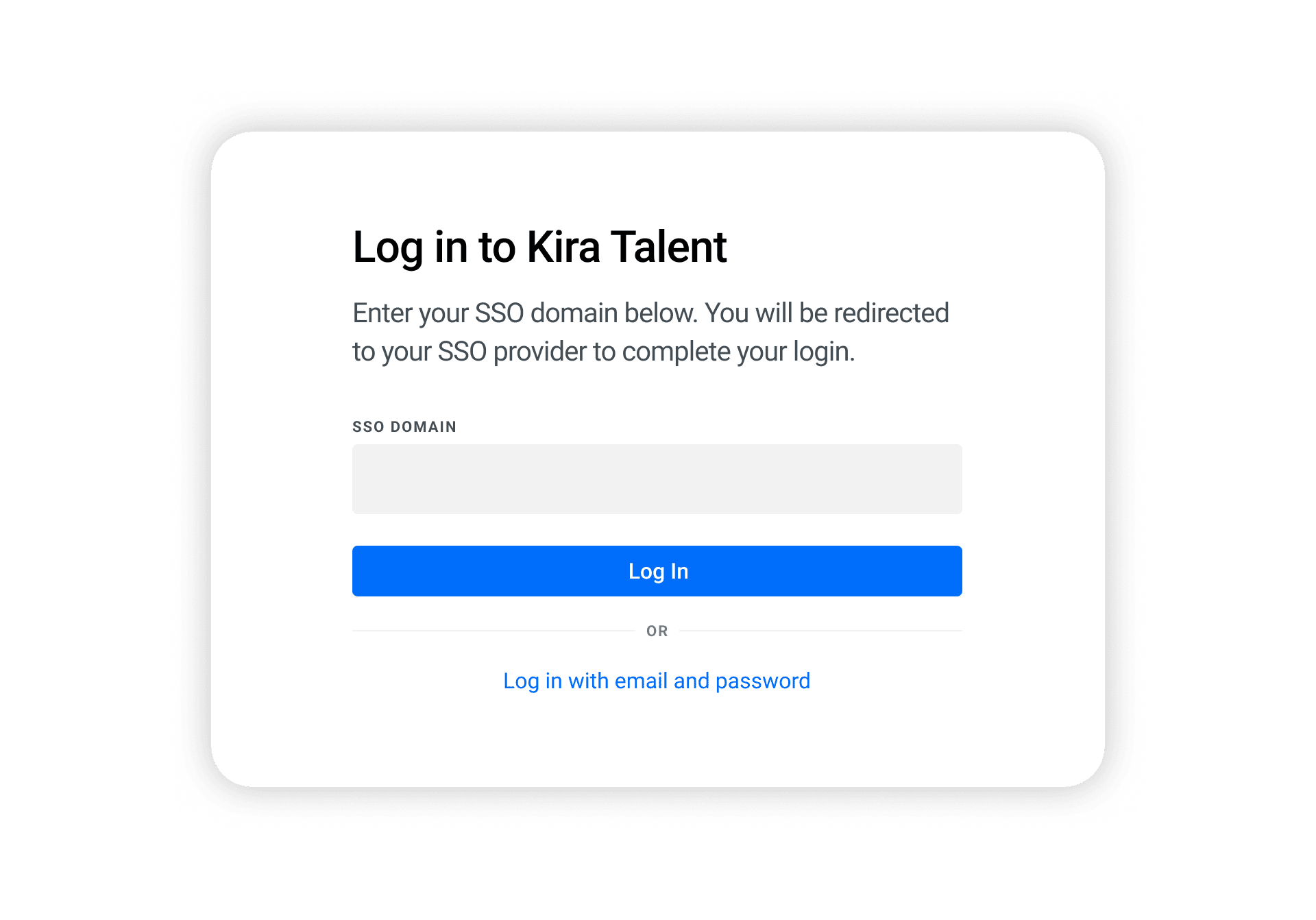
Strengthen login security with a process that is safe as well as seamless. Kira’s SSO functionality is integrated with SAML 2.0 (Security Assertion Markup Language), the leading provider of secure SSO for businesses and enterprises, that lets users balance between both security and flexibility.
Reduce repetitive tasks by enabling staff to access all the necessary platforms without reentering their information. With SSO, you log in once and can then move freely between different platforms, such as the Kira platform and your CRM, without needing to re-enter your username and password.
Keep your applications rolling in
While rolling admissions help spread the reviewing work across the admissions cycle, the continuous scheduling of interviews can end up burying your team in organizational work.
With Kira’s Rolling Applicant Deadlines feature, you determine how long you want applicants to have to complete their on-demand Kira assessment and we’ll do the rest. Once a timeframe has been set, applicants are automatically invited to complete a Kira assessment and are assigned a deadline based on when they submitted their initial application.
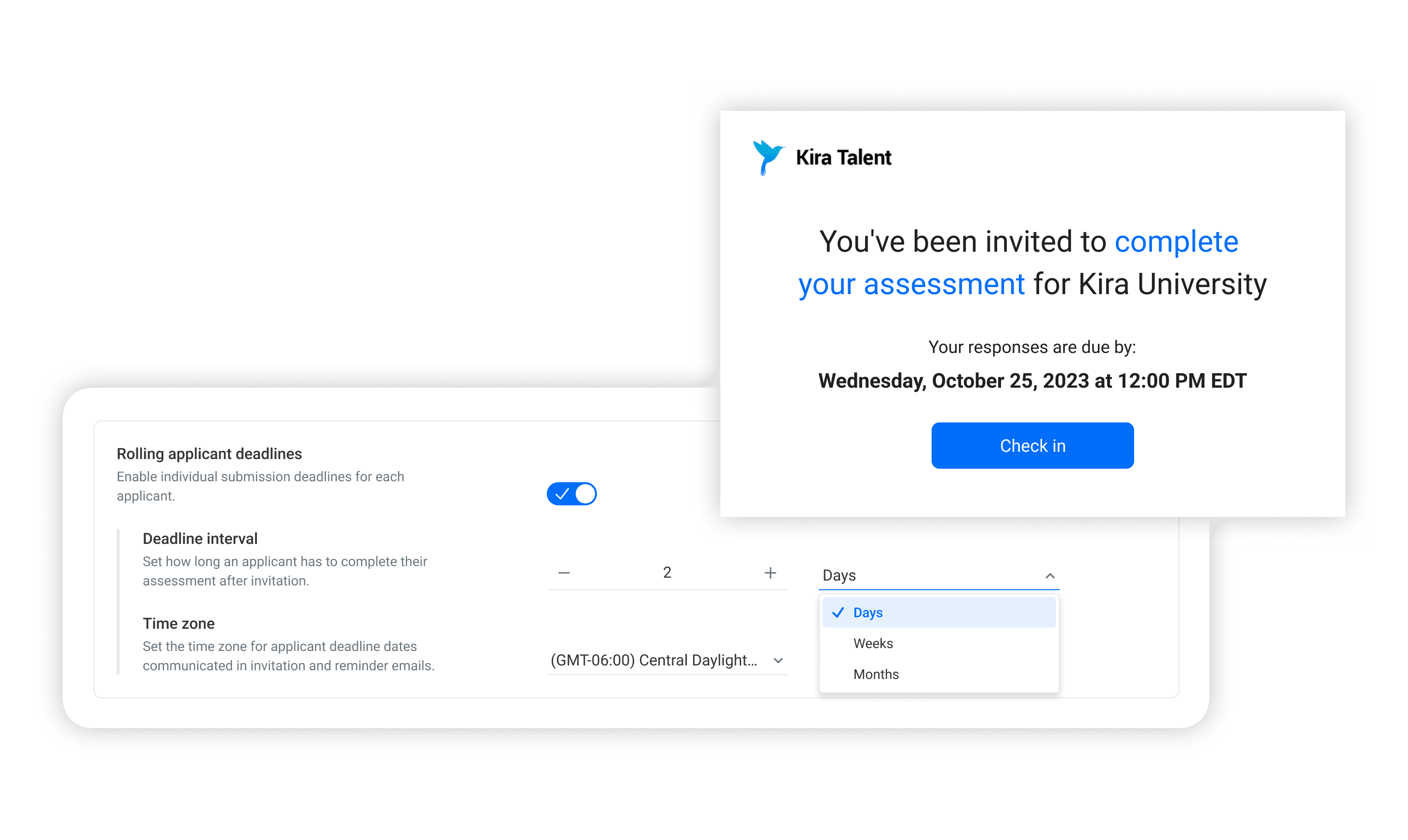
Stay on top of time zones by setting Rolling Applicant Deadlines to reflect your school’s location and clearly display the timezone in the applicant’s invitation email.
Get a feel for what works best by monitoring completion times throughout the cycle to get better insight into how long applicants need to complete your assessment comfortably.
Feel free to make adjustments with an easy rescheduling feature that enables you to modify an applicant’s deadline in just a few clicks.
A new way to nudge applicants along
Keep your assessment deadlines top of mind for your applicants with Kira’s automated reminder emails.
Choose when you want applicants to be reminded about their upcoming deadlines and Kira will take care of the rest by monitoring your applicants’ deadlines, calculating when to reach out based on your selected reminder interval(s) and sending out reminder emails to complete their Kira assessments. Once an applicant completes their assessment, they’re removed from the reminder list and won’t receive any more notifications.
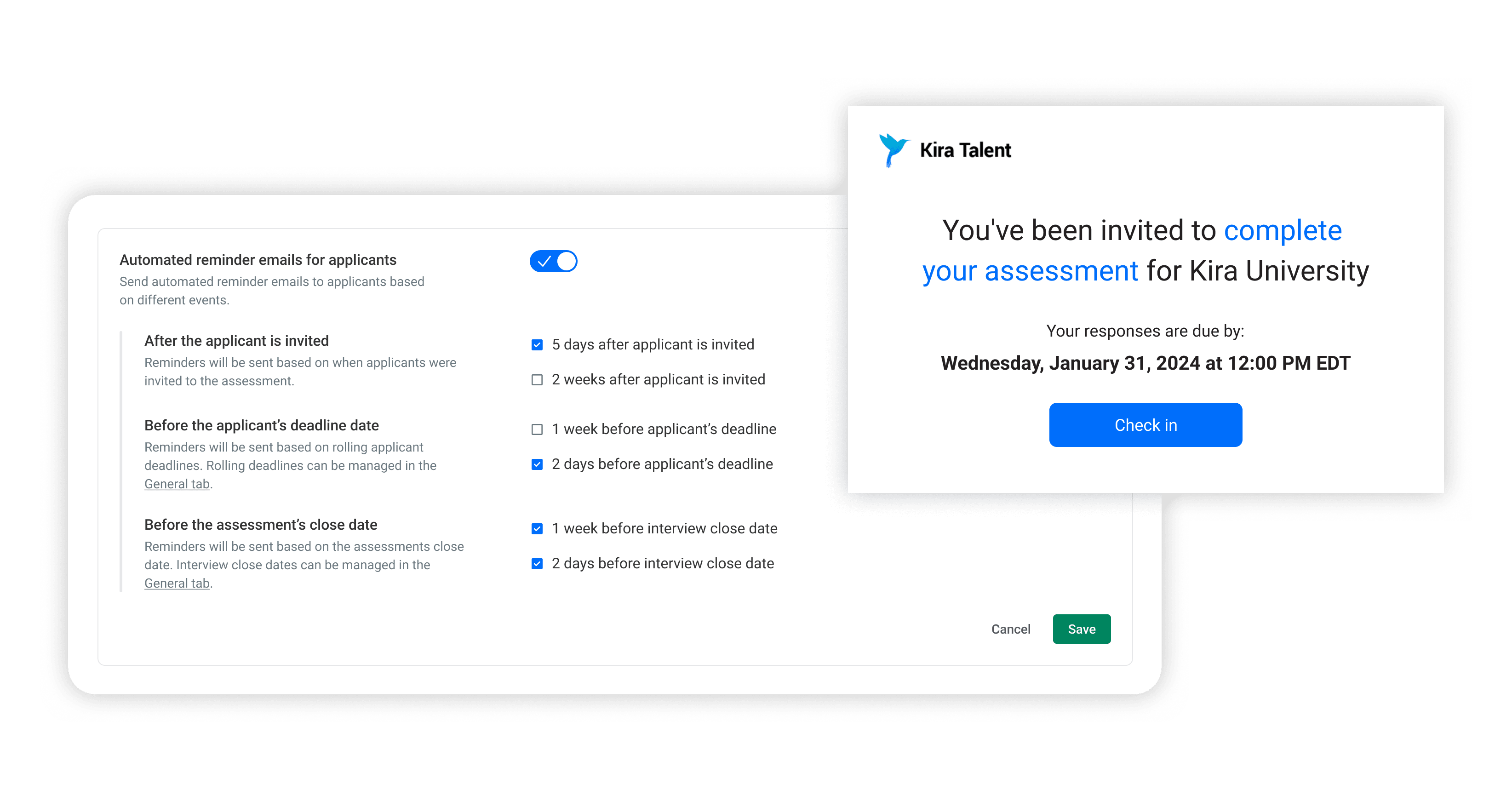
The second-most diverse university in the United States in terms of both their student and faculty bodies, Charles Drew University (CDU) of Medicine and Science is home to one of only four Historically Black Medical Colleges in the US.
For 40 years, CDU College of Medicine operated in partnership with the University of California, Los Angeles (UCLA), having students complete a combined program with their first two years of study at UCLA and then finishing their final two years at CDU. 2022 marked the next step for the medical school as they received their accreditation and launched a standalone four-year medical school program.
With that transition, came the need to develop their own admissions process.
Building an efficient admissions process for a small team
“Through our partnership with UCLA we had experience with Kira Talent's Live Interviewing, which UCLA used to conduct their Multiple Mini Interviews (MMIs),” shared CDU College of Medicine’s Assistant Dean of Admissions and Student Affairs, Margarita Loeza. “Having seen first-hand the efficiency and ease of the platform, we knew it would be a great tool for us to have in our admissions process as we grow our new program.”
For their first admissions cycle, CDU College of Medicine stuck to the basics, conducting two twenty-minute interviews per applicant.
“We wanted to meet and assess applicants like we did in the MMIs, but needed a way to do that which was more streamlined and required less of a time commitment for our faculty,” explained Loeza.
“Last year we received 974 applications, of whom 363 were invited to interview,” continued Loeza. “Each of these applicants completed two twenty-minute interviews on Kira, the first focused on the student and their life, and the second focused on their academic knowledge and experience.”
“Once the interviews are complete, we bring the entire application to the admissions committee and they make admissions decisions including which applicants will receive an offer, a rejection, or a waitlist status,” she added. “That’s how we build our cohort of 60 students.”
Creating a warm experience for applicants
Heading into their second admissions cycle, Kira made it easy for CDU College of Medicine to make adjustments and additions to their interview process based on feedback from applicants and faculty.
“We were able to easily make changes to our rubrics as well as some of our questions, to better hone in on the competencies that we want to assess,” Loeza explained. “This year, we’ve also added an introduction video into the check-in process to give applicants a warm welcome and proactively answer some questions that we got from applicants last year.”
Scaling admissions to fit a growing program
The efficiency that Kira lends to CDU College of Medicine’s admissions process is especially important as their applicant pool continues to grow.
“This year, we’ve already received more than 3000 applicants, and the application doesn’t close for a few more months still” Loeza shared. “We’re maintaining our class size for the foreseeable future, so we depend on our ability to efficiently identify the right applicants for our school. Kira Talent helps us do that.”
The University of Waterloo School of Accounting and Finance (SAF) is redefining education to shape the future of business. With a world-class faculty, a wealth of experiential learning opportunities for students, and a 96% post-graduation employment rate, Waterloo SAF attracts many hopeful applicants each year. The challenge for their admissions team is how to identify which candidates will be most successful in the program.
“We've spent several years fine-tuning how we find and enroll the best applicants to our program,” shared Admissions Committee member Catherine Kwiecien. “Long ago, we recognized that grades are not the only factor and we sought out ways to assess our applicants more holistically.”
“Our first step was to include an in-person written assessment,” she continued. “However, the logistics around that day just became a little too overwhelming. We would have over well 2,000 visitors on campus, including the applicants themselves, as well as family members and moral supporters.”
“We saw value in assessing applicants’ written communication skills through candid responses rather than a traditional essay, but there was a significant financial and time cost on that day.”
“We started looking for another way of doing things," Kwiecien explained. "That's where Kira Talent came in.”
Making bias mitigation more accessible
“It’s very important to us that we make our admissions process as equitable and robust as we can,” shared Kwiecien. “Bias mitigation is a critical component to achieving that goal.”
"We hosted workshops for our staff and faculty volunteers to make everyone aware of the implications of bias and give them some guidance on best practices to reduce its influence on the evaluations," she shared. "However admissions bias is not our expertise. We felt that we could be doing more, if only we had the right tools.”
“With Kira, we’re confident that we're making the process as fair, as equitable, and as robust as we possibly can be.”
Breaking down bias in admissions
The how-to guide to reducing admissions bias at your school
Download ebook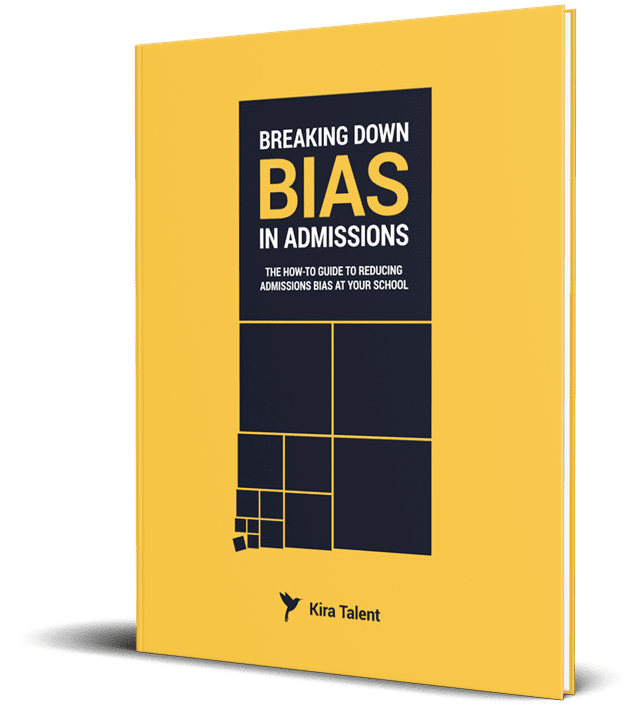
Providing an exceptional admissions experience with fewer resources
“With Kira, we were able to take our original admissions process — which was costly and fairly labour-intensive — and recreate it, gathering the same valuable applicant insights but reducing the resources needed to deliver an exceptional applicant experience,” Kwiecien shared.
“We’re enrolling students who are better communicators and stronger problem solvers because we’re able to assess them on that within the admissions process.”
“We evaluate applicants using a combination of video and written responses in an Asynchronous Assessment with Kira," shared Kwiecien. "Once they’ve completed their assessment, we have two reviewers individually score each applicant. If there's a discrepancy between those two scores, we engage a third reviewer.”
“This scoring structure means that we're not just relying on one reviewer’s perspective on an applicant, which is one of the most effective methods of mitigating bias,” she explained. “However, like most programs of our size, we didn’t have the resources in-house to conduct reviews on that scale."
"We use Kira’s Reviewer Services to help us facilitate the equitable review we strive for but completed on a much shorter timeline than we would ever be able to achieve with our internal resources,” Kwiecien shared.
Reinvesting time saved to nurture top applicants
“With the time we save by having Reviewer Services supporting our process, our team is able to spend more time reaching out to prospective students.”
“When we make an admissions offer, we have the resources to create touchpoints with the applicants, strengthening that connection and helping them picture themselves as a UW student," Kwiecien explained. "We know that the sooner we can get that image in their minds, the more successful we are at enrolling them.”
“Working with Kira has amplified our admissions process and it certainly makes my job a lot easier,” she added. “The faculty members who are involved have been impressed with the platform, the integrity of the assessment, and what the process is achieving for our program both in terms of the students in classrooms and the graduates we’re putting in front of our co-op employers.”
The NYU School of Professional Studies (NYU SPS) offers a wide variety of professional master's degree and undergraduate degree programs. From marketing and real estate to hospitality and sports management, the school’s mission is to give students the skills they need to build a successful career.
In order to do that, NYU SPS needed a way to assess critical traits and skills during the admissions process that weren’t discernible through their written application. But with thousands of applicants each cycle, the admissions team didn’t have the capacity to conduct interviews for all of their applicants.
Then in 2021, they found a solution with Reviewer Services in Kira Talent.
Scaling holistic review with Review Services
“Academics are a strong predictor of success, but they can’t tell you everything,” the Associate Dean of Enrollment Management and Student Success at NYU SPS, Larry Fillian, shared. “We needed a holistic review in order to evaluate key success factors such as communication skills and program fit.”
“Kira’s Asynchronous Assessment and Reviewer Services allow us to do that by giving us the bandwidth to interview every applicant without overwhelming our staff and faculty,” he explained. “Candidates submit their application through Slate. We collect resumes, essays, transcripts, and recommendation letters. If an applicant hasn’t previously attended an institution where the language of instruction was English, we also require them to submit a TOEFL®.”
“The Kira assessment has fit seamlessly into this existing admissions process,” Fillian continued. “Applicants who have submitted their application through Slate receive an email invitation to complete an on-demand video assessment in Kira. Once completed, the assessment gets reviewed by Kira’s team of raters who are trained on our rubrics and then we receive the scores.”
“Prior to Kira, if an applicant didn’t meet the TOEFL benchmark we had them complete the Pearson VEPT assessment,” Fillian added. “Kira has eliminated that step because reviewers are able to do a secondary evaluation of English language proficiency within the video assessment.”
“We chose to have each of our applicants be evaluated by two reviewers and set a two to four-week time frame to receive the applicant results from Kira’s Reviewer Services team,” Fillian shared.
“We had over 3,000 applicants complete a Kira assessment, and each review was delivered on time.”
Expanding a successful process to more programs
“With Kira, we’re making stronger and faster admission decisions because we have more data,” explained Fillian. “We’re getting a more holistic review of applicants and are gathering stronger data points that help us to better identify program fit.”
“We received record applications this year, with a 30% increase in domestic applicants and a 12% increase in international applicants,” he continued.
“Even with all those extra candidates, we’ve managed to reduce our decision timeframe and get offers out to applicants faster. As a result, we’re seeing record enrollment.”
“We started with a pilot of the Kira process for our human resources and master’s programs,” Fillian explained. “That applicant volume gave us the opportunity to evaluate and tweak our process with Kira before expanding it across all the programs at the School of Professional Studies.”
“For the 2023 cycle, we’re expanding Kira to all of our programs,” he shared. “We’ll be reviewing just over 10,000 applicants across all of our programs using a standard set of questions and assessments. Even scaling to all our programs, our goal of making more informed decisions and getting offers out to applicants faster will remain the same.”
“We’re now also going to use Kira’s Reviewer Services to read and evaluate our admissions essays,” Fillian added. “We estimate that this cycle Review Services will save us 3,000 hours of work.”
“Kira worked with us to ensure that their reviewers were aligned with our rubrics and scoring standards while putting protocols in place to ensure rater reliability,” Fillian added.
“This allows us to make confident and informed admissions decisions and re-invest those time-savings into our recruitment efforts.”
“We know that building stronger relationships with applications throughout the process leads to better yield,” he continued. “So that’s where we want to focus our time and energy.”
Creating an engaging applicant experience
“Our faculty are really enjoying the process with Kira because they get a more comprehensive look into the incoming cohort which helps them better prepare to receive these students in the classroom,” Fillian shared. “Likewise, the applicants really enjoy Kira because they feel they’re able to show off more of themselves, as opposed to in a more traditional process.”
“We had a 96% applicant approval rating of the Kira experience.”
“A lot of programs are using Kira for their admissions processes, so there’s a word out there amongst prospective applicants that it's a positive experience rather than an intimidating one,” he added. “If our applicants had any questions or connection issues, the Kira team was on standby to help solve them, so our applicants felt taken care of. For this past cycle, Kira was able to solve 100% of applicant queries without our team needing to get involved.”
Setting up your admissions process for success
For the 2023 cycle, NYU School of Professional Studies is also incorporating Kira’s Advanced Insights tool into their admissions process, to study the correlation between AI personality assessment and student success.
“I’m a tech enthusiast,” Fillian shared. “I’m always interested in the latest in admissions technology. Advanced Insights will analyze applicants’ soft skills using their recorded Kira video responses.”
“We’re excited about experimenting with the tool, tracking our successful admits and their success rates in their program, and then of course, in good higher education tradition, analyze the data to death,” he added. “I’m hopeful that we’ll identify predictors of student success.”
“I believe that the more data you can gather in admissions, the better,” Fillian continued. “Especially in light of the supreme court’s decision on affirmative action, we need more holistic data review.”
“Having Kira in our admissions process is helping us achieve that,” he continued. “I often recommend the platform to other schools, telling them to follow our steps and start with a pilot. That way you can test it out, fine-tune the process with a smaller subset of applicants, and ultimately make a very informed decision when you expand across the rest of your programs. Plus, when those pilot programs are singing the praises of their new process, it will help the whole school get on board.”
An independent school for grades 6 through 12 in Ann Arbor, Michigan, Greenhills School is considered a newcomer in the local private education space. Founded in 1968, Greenhills doesn’t have the history of many of its neighbouring schools, but what it does have is a reputation for highly engaging and nurturing classroom dynamics.
“We pride ourselves on small classroom sizes which allows our faculty to really get to know our students,” shared Greenhills’ Director of Enrollment Management, Sylvester Cutler. “We see every child as one-of-kind and we really focus on identifying their individual talents and nurturing those to their full potential.”
“You can have great programming and state-of-the-art facilities, but at the end of the day the dynamic between the students and the teachers makes all the difference,” he continued. “We look at that relationship as being essential to the overall success of our school, so we make sure that we're putting the best educators in the classroom. Then we ensure that we're finding students who are going to be successful in that environment.”
For Greenhills School, Kira Talent plays a critical role in identifying those students from their growing pool of applicants.
Getting the most value from faculty time
“In 2021 we saw an acceleration of interest in our school,” shared Cutler. “My admissions colleagues are also teachers, so they spend 50% of their time in the classroom. That was fine when we had a lower volume of applicants, but when we reached 140 applicants for sixth grade alone, we were constantly scrambling to stay on top of our work.”
“Prior to Kira, we brought applicants to campus for both an in-person interview and proctored work sample with a member of our staff or faculty,” he explained. “Whoever was available to administer those assessments would take notes and write a summary to include in the respective applications. Each completed application was then reviewed by at least two faculty members.”
“Faculty were dedicating more than 20 hours each simply to review applications,” Cutler shared. “And even with that time commitment, they were only reviewing around 60 applicants, and actually meeting even fewer.”
“It wasn’t a good use of faculty time,” he continued. “We wanted to find a way to keep faculty involved in our admissions process but ensure that we were getting the most value out of their time.”
In 2022, Greenhills transitioned their admissions interview to a custom Kira Asynchronous Assessment, helping them streamline their reviewing process while aligning with their school values and admissions goals.
“With Kira, we’ve been able to reduce the time commitment for faculty by nearly 45% even while having them review every applicant.”
“On top of that, they feel they’re getting a better understanding of applicants’ personalities because they get to see each applicant first-hand,” Cutler continued.
“Kira’s competency-based structure has allowed us to divide the application review amongst the faculty, reducing the reviewing time to approximately five minutes per application and enabling each faculty member to see every applicant,” Cutler added. “ They’re able to easily work the review into their day because instead of having to block out large chunks of time to participate in the reviewing process, they’re able to take a few minutes between classes or during a free period to watch a two-minute video or read a short written response.”
“That’s saving each faculty member around 10 hours of work each admissions cycle.”
Nurturing applicants and their families for a higher yield
“We reinvest the time that Kira saves us in how we engage with our applicants and their families,” shared Cutler. “We’re very responsive to families and work to create a lot of touchpoints with them throughout the enrollment process.”
“There’s a common misconception that hosting interviews on campus is the only way to build connections with applicants and their families,” Cutler explained. “In reality, when we conducted in-person interviews we would have eight applicants and their families visiting that day. That meant there were eight work samples that needed to be proctored and eight interviews to be conducted. I had a team of four, two of whom were also teaching half of the day, so we really had very little time to engage the applicants and their families outside of the assessment rooms.”
“Delivering the assessment online with Kira means that when we have families come visit our campus, we’re able to spend that time solely on building relationships with them.”
“There’s a much better atmosphere on campus for our visit days,” Cutler explained. “Families are here to explore campus, get a sense of our school community, and get to know our staff and faculty. With Kira, those activities aren’t overshadowed by the stress of their assessment.”
“Likewise, our staff and faculty aren’t preoccupied with conducting assessments and are able to be present and engaged during the visits,” he continued. “As a result, we achieved a much higher conversion rate in completed applications this year.”
“In 2022, we increased our conversion rate by 28%, to reach an application completion rate of 84%.”
“A significant factor in achieving that conversion is the time we dedicate to connecting with families and guiding them through the process,” he added. "With Kira, we’ve been able to reinvest the time saved into an expanded touchpoint strategy. We now have the time to engage with families throughout their application process; checking in to see how they're doing, sending them information, and making sure that we’re proactively addressing any questions or concerns they may have.”
“These are touchpoints that we always wanted to have, but unless we worked 20 hours a day it just wasn't feasible.”
Building a bespoke assessment
Kira’s fully customizable assessment helped Greenhills School easily replicate the key components of their original assessment and interview while providing them with new opportunities to enhance the equity and effectiveness of the overall experience.
“The onboarding experience with Kira was really incredible,” Cutler shared. “We started by talking about our school mission and values, what makes Greenhills unique, and what traits and skills make for a successful Greenhills student. Kira then took everything we had shared and distilled those larger concepts and values into unique and creative questions for our applicants.”
“We decided to use a combination of timed video and timed written responses in Kira to recreate both our interview and work sample evaluation within one assessment experience,” Cutler explained.
“The platform gives us the flexibility to easily assess for different skills and competencies while maintaining a structure and consistency to the assessment across all applicants.”
Using Kira’s Horizontal Review, Greenhills assigns faculty members to review specific responses across all applicants.
“For example, we have math teachers scoring the quantitative math problems and English teachers evaluating the written communication responses for every applicant,” explained Cutler. “It allows us to be more accurate, fair, and consistent in how we evaluate applicants.”
Mitigating bias for fair admissions
“Kira also offers bias mitigation training as part of the onboarding process,” added Cutler. “It was a great exercise for our staff and faculty to go through, and gave them better insight into the benefits of our new process and why we chose to structure things in certain ways.”
“Prior to Kira, for example, I might have interviewed three different applicants during one campus visit,” he explained. “When I sat down to write my review at the end of the day, it could be difficult to remember all the details from the interview I had that morning.”
“Kira has eliminated that concern,” Cutler continued. “Reviewers are scoring applicants as they’re watching their responses, and they can replay the video as many times as they need to.”
“Having the recordings on demand also means that we’re not relying on one reviewer's summary of the conversation to make our admissions decisions,” shared Cutler. “If we’re discussing a particular applicant in the admissions committee meeting, we can just pull up their Kira assessment and watch their responses.”
“The admissions committee gets to hear from the applicants directly rather than seeing them through the filter of the person who interviewed them.”
“Kira has helped us structure our admissions process to align with our mission of identifying and nurturing what makes every student unique,” Cutler added. “From the start, we tell our applicants that the application process is an opportunity to show us their personality, and thanks to Kira we all get to see it.”
The ripple effect of a flexible assessment
“The feedback from our faculty has been overwhelmingly positive,” Cutler shared. “Within three weeks, even those who were initially hesitant came back and shared how much more they like the process with Kira.”
“Our success has even inspired our language department to rethink how they do the language placement, transitioning the oral assessment from in-person or Zoom to an Asynchronous Assessment in Kira,” he added.
“That kind of feedback is really the icing on the cake because it solidifies that Kira doesn’t just save us time, it’s making our overall admissions process more effective.”
“It's really a great tool,” Cutler continued. “I'm happy to talk to anyone that would be interested in hearing about our experiences because they've been so positive.”
Create the assessment you want easily with the new features and functionalities launched on the Kira platform this quarter. Whether you’re bringing everyone together with Forum Sessions, assessing applicant collaboration in Group Stations, or taking full control of your assessment with the Asynchronous Assessment Builder, Kira’s newest features are here to help you achieve your best admissions cycle yet.
Bring everyone together
With Forum Sessions, you can host meetings with up to 50 participants directly in the Kira platform.
Build the session right into your Live Interviewing schedule to create a seamless experience for reviewers and applicants. You can also create standalone sessions to meet with applicants before or after they complete an Asynchronous Assessment.
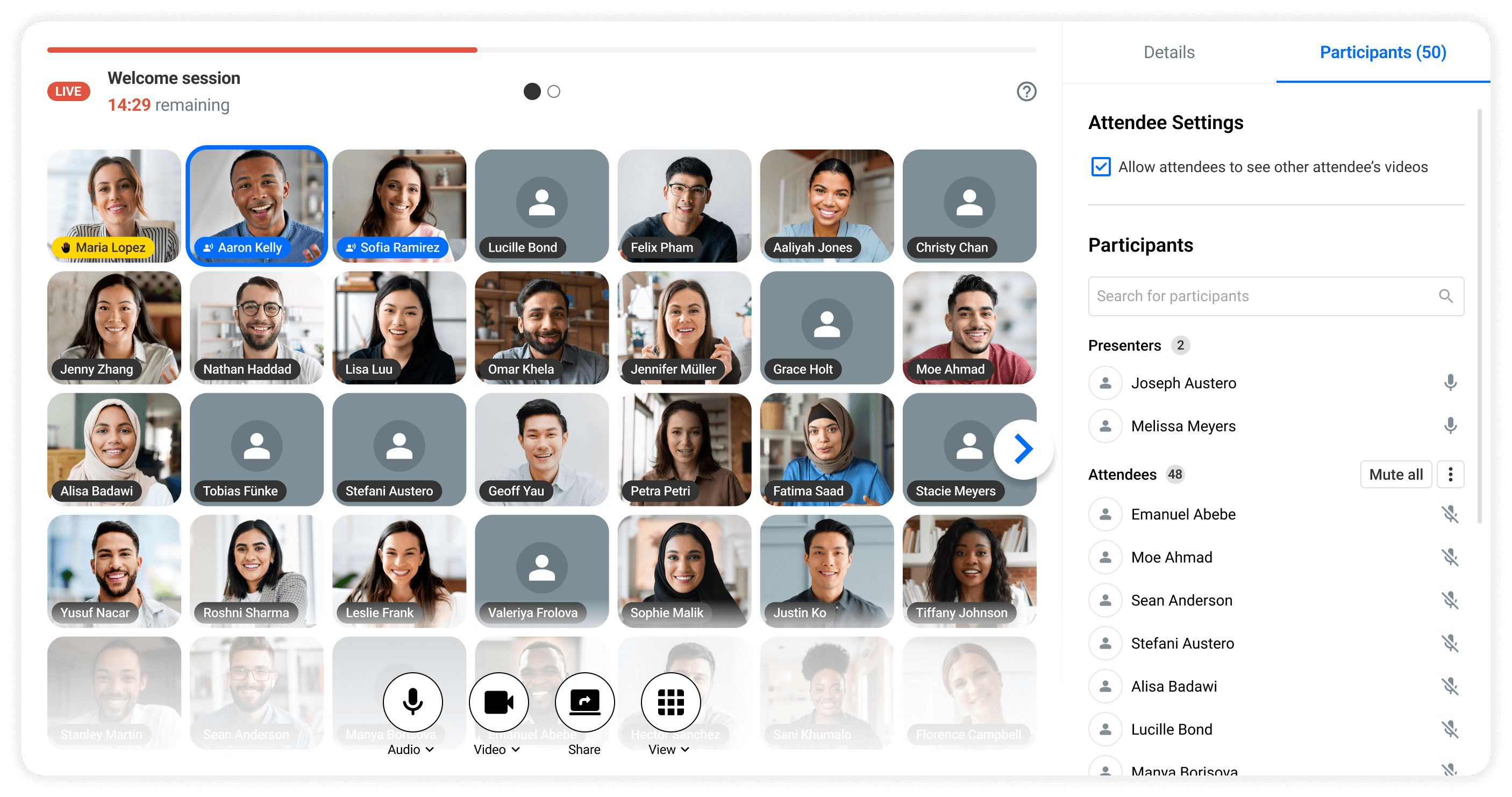
Keep the conversation flowing with features such as admin volume control, raising/lowering hands, and screen sharing, Forum Sessions in Kira Talent includes all the tools you need to easily engage large groups.
Make deeper connections with your applicants by creating a space where applicants can get comfortable before their interview, decompress after completing an interview, meet the right people in real time, or learn more about your program.
Get your team on the same page whether it’s hosting reviewer training sessions or a pre- or post-interview sync with your review team.
Round out an elevated interview experience and create a lasting final impression for your applicants so they walk away with your program top-of-mind.
Assess applicant collaboration
Gain insight into how your applicants will work collaboratively in the classroom and beyond. Group Stations in Kira Talent, allow you to bring together groups of two or more applicants during a Live Interview. Whether you want a group of applicants to move through each room together as a unit, or you want individual applicants to come together for a single station, you can build it in Kira.
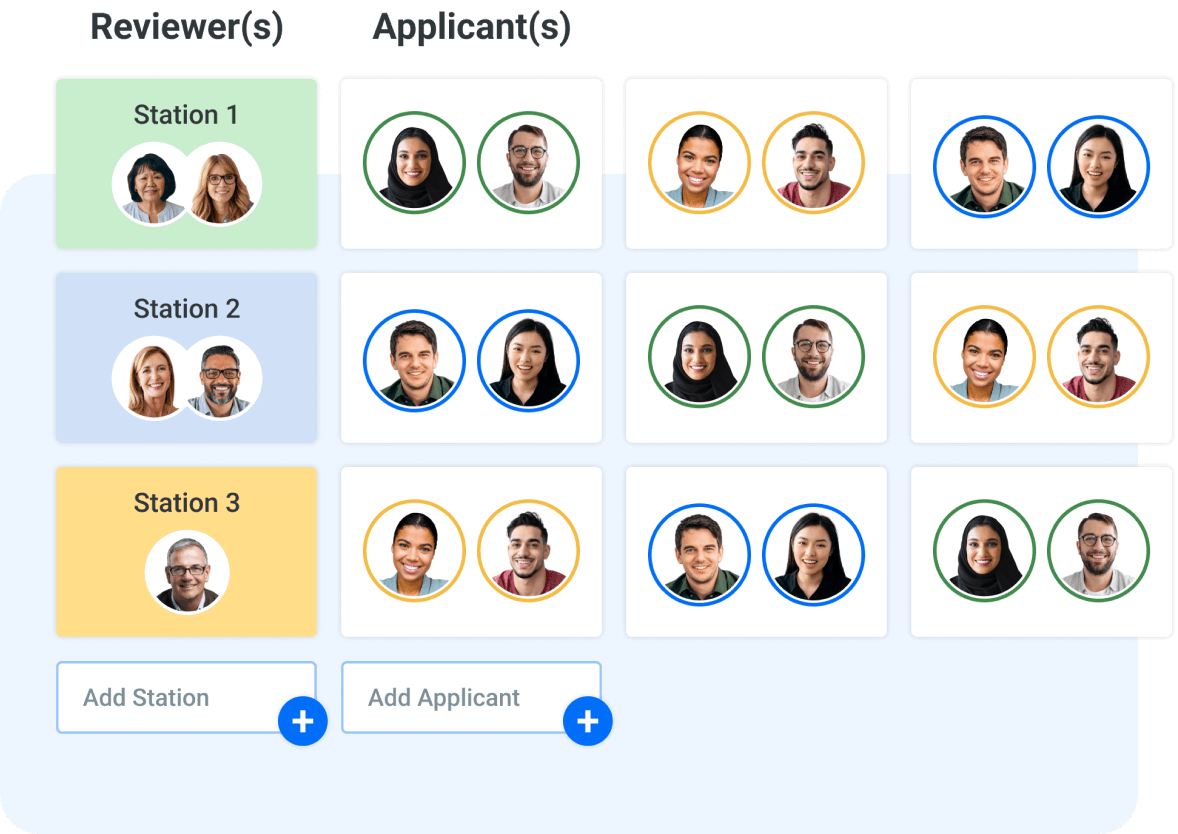
Take full control of your assessment
The new Asynchronous Assessment Builder puts the power to build and adjust your Asynchronous Assessment in your hands.
With a simple and intuitive builder, you can create your custom assessment, from adding competencies and rubrics to uploading your welcome and closing videos.
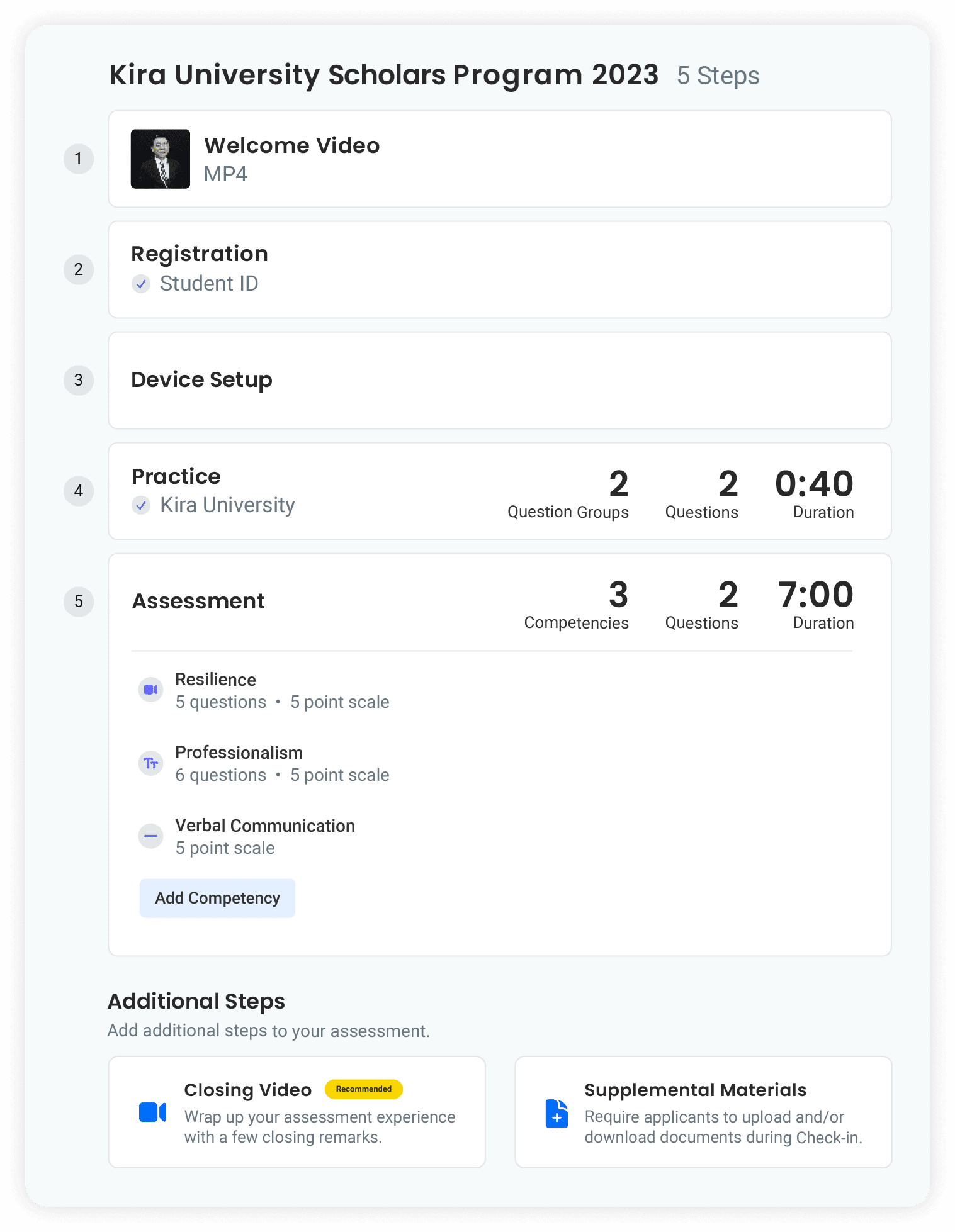
Be independent (with full support) with the ability to build and make changes to your assessments while still having a dedicated Client Success Manager to enable custom options, answer your questions, and assist with any aspects of setting up or editing your assessments.
See what your applicants see to ensure a seamless experience for applicants during each step of the registration and assessment completion process.
Duplicate your assessment without doubling your work with the Asynchronous Assessment Builder’s convenient duplication of competencies and rubrics when creating new assessments - making them easy to set up and test.
Coming Soon: Rolling Deadlines in Async
Applicant-specific deadlines are coming soon to Kira’s Asynchronous Assessments. Align your assessment to your existing rolling admissions process by assigning individual deadlines to different groups of applicants.
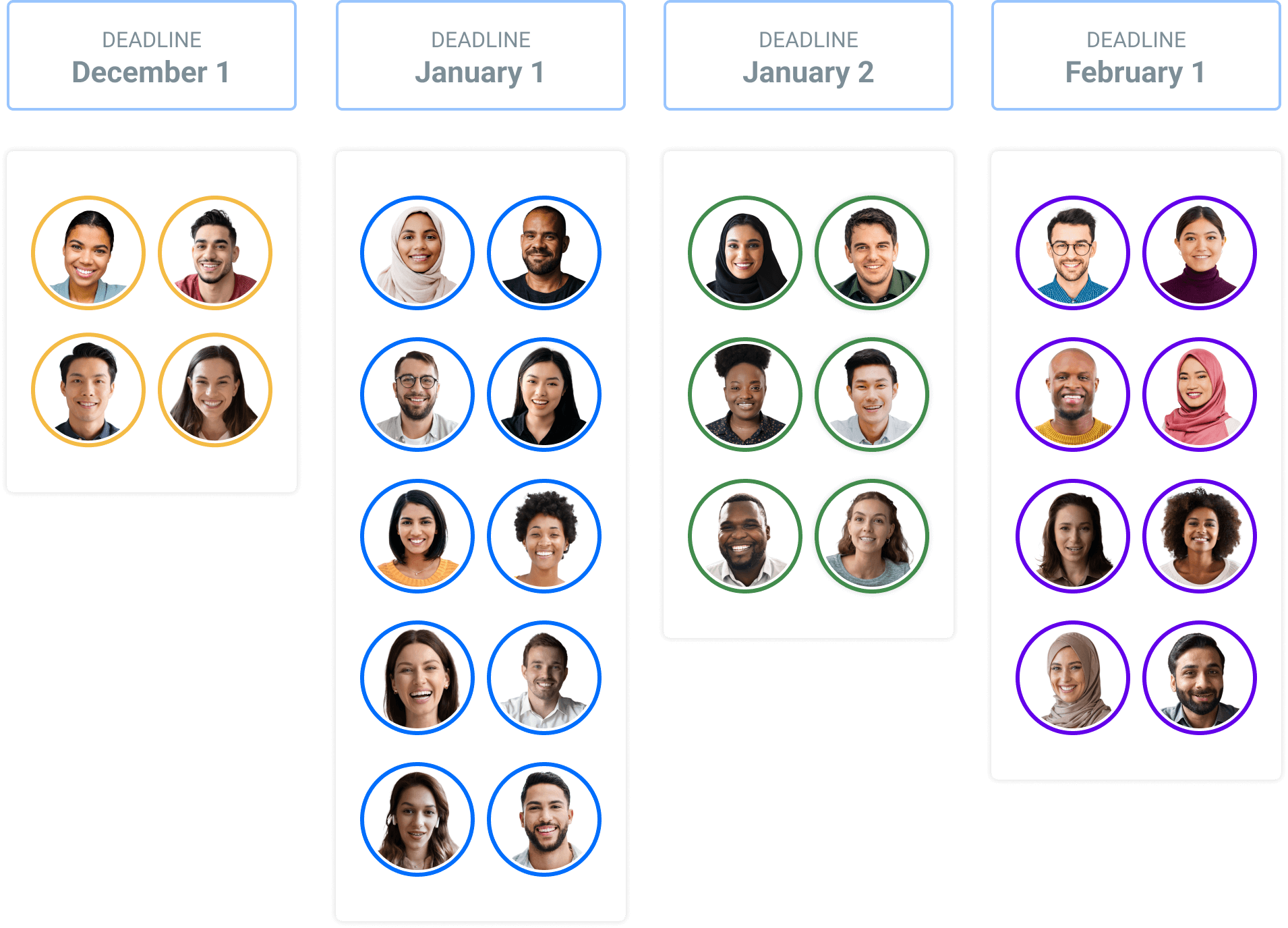
The #1 ranked school of pharmacy in the United States, the University of North Carolina at Chapel Hill’s (UNC) Eshelman School of Pharmacy leads by example when it comes to holistic and comprehensive admissions processes.
Keeping patient care at the heart of every decision, UNC Pharmacy goes beyond academics to evaluate applicants’ traits and soft skills to ensure that they’re enrolling candidates who are not just good students but also have the potential to be great pharmacists.
“One of the biggest draws of our pharmacy program is the time we dedicate to in-clinic immersion experiences,” shared Heather Azzu, the Director of Admissions at UNC Eshelman School of Pharmacy. Starting with a one-month immersion after their first year, students complete over 50% of their curriculum (2,400 hours) in real-world pharmacy settings in North Carolina including options during the fourth year in locations around the globe.”
“These immersion experiences help our students cement the knowledge that they’re being taught in the classroom,” she continued. “But for that to be successful, they need to be able to communicate and work well with many different people — skills that you can’t assess through a traditional application.”
Those skills are what Kira Talent is helping the team at UNC Eshelman School of Pharmacy evaluate.
Redefining the pharmacy admissions process
“Each year we receive approximately 500-600 applicants, of whom we invite around 250-300 to interview to reach our average enrolled class of 150 students,” shared Azzu.
“The interview is a critical component in our admissions process because it brings that human element to the application,” explained Bonnie Barsalou, the Admissions Coordinator at UNC Eshelman School of Pharmacy. “It helps us get to know each applicant as a person and begin to understand how they think, how they process information, and how they demonstrate important interpersonal skills that are necessary for strong patient care.”
“You can’t really assess those on-your-feet communication skills through a written essay,” Azzu added. “You need that live interaction.”
UNC Pharmacy’s interviews consist of several stations at which applicants are presented with a different scenario.
“It’s not about testing their pharmaceutical knowledge, it’s about how they react to a situation,” explained Azzu. “We’re looking for insight on how they would interact with patients and think through real-life problems or challenges.
“We used to conduct all of our interviews in person,” she continued. “Because we have a rolling application process, which is open from July through to February, we were hosting multiple interview days each cycle.”
“It took us more than a month just to organize the events and secure the commitment of every person that had to physically be there.”
“In the week leading up to an in-person interview day every working minute is devoted to preparation,” added Barsalou. “If you take that amount of time and multiply it by two or three employees, and then multiply that by several interview cycles, the time commitment really adds up.”
“With Kira, we’re saving all of that time.”
Eliminating organizational burdens
“Kira makes the organization and execution of interviews incredibly easy,” shared Azzu. “The pre-interview work is so minimal and it’s much easier to get faculty to participate because they don’t have to be on campus for the interview day. If they’re working from home or travelling, they just need their laptop and an internet connection.”
“This past year we were able to add two interview dates at the last minute,” she continued. “We had many great applicants apply late in the cycle and didn’t have enough spots in our scheduled dates to interview them all.”
“We sent a quick email to Kira asking to add two more interview dates and they immediately replied with ‘Absolutely, we’ll set it up!’.”
“That has been a game changer for our admissions process,” Azzu added. “Prior to Kira, we wouldn’t have been able to consider those applicants because we were out of interview days. Instead, we were able to interview every single qualified applicant.”
Getting offers out faster
On the other side of the interview, Kira’s custom in-app rubrics have also brought increased efficiency to UNC Pharmacy’s admissions process.
“We consider the whole application when making our admissions decisions,” Azzu explained. “Their interview scores are the final piece of that holistic review.”
"Prior to Kira, faculty had to upload their completed scores into an internal classroom grading system,” explained Azzu. “We often experienced a delay in collecting all of the scores, which lengthened the amount of time that it took to make decisions and get offers out to applicants.”
“With Kira, our faculty are scoring the interviews directly in the platform, so all that data is available to us immediately after the interview,” she continued.
“That means that we’re able to turn around and make offers to applicants within a week.”
“It’s more streamlined, more effective, and more time efficient,” added Barsalou.
Reaching and assessing a more diverse applicant pool
“We’re now able to reach more applicants and assess them efficiently and equitably with Kira,” Azzu shared.
“The physical restraints that come with hosting interviews on campus have been completely eliminated,” Barsalou continued. “Our in-person interviews were limited by the availability and size of the rooms. We typically had the space for a group of 15 applicants to participate in each session but room availability on campus meant that we only ran three sessions per interview day. With Kira, we have the flexibility to add extra sessions to cover the larger interview days and host up to 60 students instead of the on-campus maximum of 45 applicants.”
“And it’s not only that we can interview more applicants at one time, but Kira also removes time and cost barriers for our applicants,” Barsalou added.
“It’s extremely helpful for applicants to not have to travel to campus,” Azzu continued. “They can fully participate in the admissions process without having to worry about the financial and logistical implications of travelling here for an interview day.”
Providing a more accessible route to interview for more applicants, UNC Eshelman School of Pharmacy then uses Kira’s Horizontal Review – where reviewers assess multiple applicants for a single competency – to reduce bias and create a level playing field for its diverse applicant pool.
“Our reviewing process allows reviewers to become experts in assessing one specific competency,” Azzu explained. “They’re hearing responses to the same questions across 25 to 30 people which allows them to be more accurate in their scoring.”
“It also eliminates the potential for a situation where an applicant and a reviewer get off on the wrong foot and that impression influences the applicant’s entire interview score,” she continued. “With Kira’s Horizontal Review, their candidacy doesn’t rely on just one person’s perception.”
The benefits of a full-service solution
“Kira provides us with the flexibility to build the interview we want without any of the technical challenges that come with other online options such as Zoom,” shared Azzu. “When you’re trying to manage multiple links, applications, and windows it can be very overwhelming.”
In Kira’s Live Interviewing, UNC Pharmacy’s applicants click a single link and the platform automatically moves them into the right interview rooms at the right times, according to the set schedule. Reviewers similarly click their link to enter the interview room, and then use the in-app rubrics and notes section to meet and evaluate applicants all in one platform.
“Kira allows us to focus fully on our applicants.”
“You don’t have to contend with any manual or technical work behind the scenes, so reviewers can wholly focus on their conversations with the applicants,” Azzu shared.
“And because we on the admissions team aren’t having to manually run the session, we can be much more responsive to our applicants if they reach out with questions before or during their interview,” Barsalou added. “If applicants had any kind of connection issue or their microphone wasn’t working properly, they were getting support both from the Kira team and our admissions team. It’s really improved the overall experience for them.”
“Applicants have shared with us how easy it was to use Kira and how comfortable they felt in the session,” Azzu added. “Likewise, we hear a lot from faculty just how much they like using the platform.”
“After the initial setup and reviewer training, Kira has been a self-running process. We just log on and it pretty much handles the rest.”
Looking toward the future of admissions
“There has been a lot of discussion around whether we keep the hybrid admissions process or go fully virtual in the future,” shared Azzu. “We don’t want to completely remove all in-person events, but we’re looking at options like hosting admitted student days where successful applicants have the opportunity to come to campus, engage with us, and get a feeling of the atmosphere and community at the school.”
“In general, we’ve been able to transition our traditional admissions experiences online with great success,” she continued. “We host sessions for the students during the times that they are not interviewing where they can learn about student life. We have group sessions at the end of the interview circuits where applicants can decompress and talk to current students.”
“There are so many different ways in which we can engage our applicants where they are. And the Kira platform can help you do that by being as flexible as you need it to be.”


